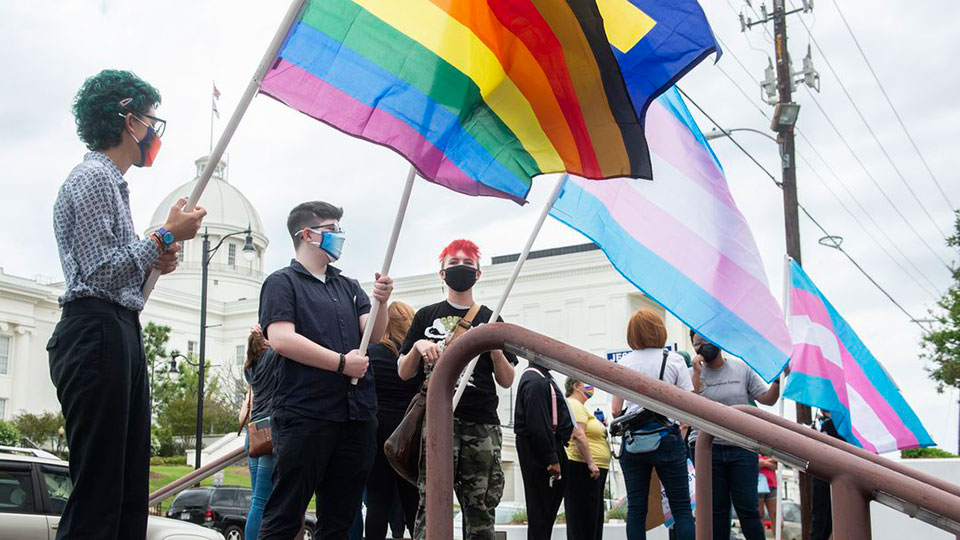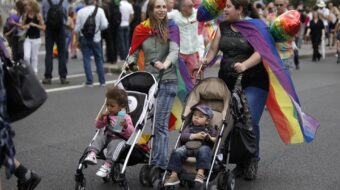
MONTGOMERY, Ala.—Alabama Gov. Kay Ivey signed HB 391 into law on April 23, which when it comes into effect, will ban transgender individuals from participating in sporting events that align with their gender.
Specifically, it bans schools from allowing students to compete against those who are not their “biological gender” unless the event specifically allows—in their words—“both biological genders” and is set to be put into effect three months after the signing.
This legislation is part of an intensive ramping up of anti-trans legislation and government action across several states, including Arkansas, Tennessee, Mississippi, and Texas, among others.
The use of the LGBTQ community—especially transgender people—as a scapegoat has been a feature of Republican politics in Alabama for some time. Such figures as Donald Trump’s ambassador to Slovenia and planned 2022 U.S. Senate candidate Lynda Blanchard has been railing against transgender people and a mystical “socialist elite” as a substitute for discussing policy that would help people.
While Alabamians wait for HB 391 to take effect over the next three months (and the inevitable lawsuits it will spark that will have to be fought with public dollars), the state’s social crisis escalates.
State prisons are overcrowded, with many inmates incarcerated for non-violent or victimless offenses. Ivey’s solution is the spending of $3 billion for the construction of more prisons.
Several thousand Alabamians remain uncovered by any health care or insurance plan while there has been a steady decline in the number of rural hospitals over the last decade, with many more currently on the financial edge.
Many conservative politicians, like Ivey and Blanchard, who have been inciting hatred against vulnerable populations as easy scapegoats have subsequently failed to discuss any of the very real economic issues facing the people of Alabama. There is no wide-ranging legislation meant to solve the decline of rural healthcare in the state, and the consistent solution to over-policing is just more jails and more police.
Modern anti-LGBTQ legislation is set to a backdrop of poverty and hardship already faced by the target populations. According to a study from the University of Chicago, LGBTQ youth are 120% more likely to report being homeless compared to the rest of the population. They are also distinctly overrepresented in the overall population of homeless youth, according to the Serving Our Youth 2015 study.
The latter also showed a significant portion of these youth report they have previously faced bullying and familial rejection—particularly transgender people. In each field listed—bullying, rejection, abuse, trafficking, and so on—they self-report at a higher rate than even the rest of the LGBTQ community.
Legislation such as HB 391 will not only deny the right of trans people to participate in events with and against those of the same gender—it will also reinforce future anti-trans legislation and exacerbate these issues by empowering systems and people which perpetuate the prominence of these factors.
Unfortunately, alongside the Republican right, the Alabama Democratic Party has had a very rocky historical relationship with LGBTQ issues even in recent years. In 2017, eighteen Democrats in the Alabama House voted in favor of the Child Placing Agency Inclusion Act, which was designed to allow adoption agencies to refuse adoptions on the basis of religious beliefs. It directly targeted LGBTQ couples and their ability to adopt.
Lashunda Scales, a Birmingham mayoral candidate and Democrat, recently commented on the increased public discourse surrounding the LGBTQ community by calling the community a “myth.” She affirmed her personal belief that being LGBTQ is a choice and has justified her position by saying that Birmingham has “real problems” that LGBTQ people, by implication, apparently, do not have. Scales has responded to the firestorm her comments sparked by saying she will be a “mayor for everyone” and follow what the law says.
It’s worth noting that the Alabama Democrats at least didn’t see any of their Senate members vote for the Child Placing Agency Inclusion Act, and in the case of HB 391, no Democrats have voted for this piece of anti-trans legislation.
HB 391 is just the start of the anti-LGBTQ effort underway in the state, however. Another anti-trans bill from the Senate, the Vulnerable Child Compassion and Protection Act, introduced by Trussville Sen. Shay Shelnutt, seeks to enact draconian restrictions on health care for transgender minors. It would ban puberty blockers, hormone therapy, and various other gender-affirming medical procedures for people under 19.
This bill could potentially be life-threatening to transgender youth with gender dysphoria, for which lack of treatment can mean depression and even suicide. As of writing, there have been no updates on the status of this bill in the Alabama House.












Comments